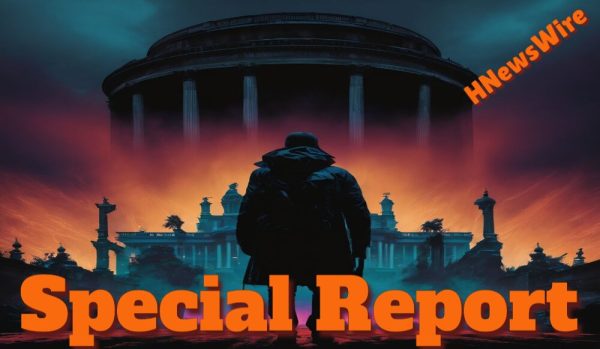
Advisory: Be careful of what you read on social media. The algorithms used by these platforms have no regard for Biblical truth. They target your emotions to keep you engaged on their site so their advertisers can drop more ads. These platforms exist to enrich their stockholders. Consider God’s promise to Believers in James 1:5, “If any of you lacks wisdom, you should ask God, who gives generously to all without finding fault, and it will be given to you.”
Featured Story

Since 2017, South Korean banks have been targeted to an average of roughly 600 cyberattacks each day, with China being the primary source of attacks, according to the Financial Services Commission of South Korea (FSC).
According to Yonhap News Agency, a recent FSC report released by South Korean National Assembly member Kang Min-Kook revealed that 17 banks in South Korea were subjected to 1,091,606 cyberattacks from 2017 to 2021, averaging 598 attacks per day, with at least a third coming from China.
The FSC data, according to the report, only includes financial institutions that provide retail banking services. If savings banks, insurance firms, and other financial institutions were included, the number of cyberattacks would be far greater.
According to FSC data, foreign IP addresses were responsible for 82.2 percent of cyberattacks, with China accounting for 34.7 percent and the United States accounting for 11.2 percent. The remainder was sourced from India, France, and other nations.
The annual number of cyberattacks climbed by more than fourfold over five years, from 63,000 in 2017 to over 273,000 in 2021.
Despite the repeated cyberattacks, the banks did not experience a significant breach because their internal security measures efficiently stopped harmful code and segregated computer networks, according to the FSC report.
“Despite the fact that there has yet to be a breach,” Kang said, “cyberattacks are on the rise.” “A single breach can result in a massive loss.” The danger must not be underestimated.”
Cyberattacks from China have long been a global worry, with FBI Director Christopher Wray accusing Chinese state-backed hackers of stealing more personal and corporate data in the US than all other countries combined in late January, according to an NPR story.
The Chinese regime was criticized by NATO allies, the European Union, Australia, New Zealand, and Japan in July 2021 for a massive cyberattack on Microsoft Exchange email servers earlier that year.
The committee of MPs and senators in charge of federal security policy has discovered holes in Canada’s cyberdefenses, which might expose several government organizations to state-sponsored hackers from China and Russia.
Cyberthreats to government systems and networks, according to the National Security and Intelligence Committee of Parliamentarians, constitute a substantial concern to Canada’s security and government operations, according to a new report.
Beijing and Moscow are the most sophisticated cyberthreat actors attacking the government, according to the report, while Iran and North Korea are moderately advanced and offer less of a threat.
Although nation states are the most advanced dangers, the committee claims that any actor with harmful intent and technical capability puts the government’s data and electronic infrastructure at risk.
The federal government has established a powerful cyberdefence system to fight this threat during the last decade, according to the report.
However, it is hampered by inconsistencies in policy implementation and the utilization of cyberdefense services throughout government.
The report, which was tabled in Parliament late Monday, is a redacted version of a confidential document that Prime Minister Justin Trudeau received in August.
According to the analysis, governments are extremely appealing targets for cyberattacks.
“The federal government has vast amounts of information about Canadians, corporations, and innovative sectors like universities and research organizations. Cyber breaches of this data might expose sensitive personal information about Canadians and suffocate individual businesses and the economy.”
According to the research, the government also administers international, trade, and security ties through electronic infrastructures that, if hacked, might harm federal policies and jeopardize Canada’s important interests.
It adds to our understanding of the scope of an early attack by a Chinese state-sponsored attacker that served as a “wake-up call” for the federal government.
China attacked 31 departments between August 2010 and August 2011, with eight of them suffering serious concessions. There were significant data losses, including senior government officials’ email conversations and wholesale theft of information from multiple departments, including briefing notes, strategy documents, secret material, and password and file system data.
The study also includes new details of a crippling 2014 cyberattack on the National Research Council, claiming that a Chinese state-sponsored actor utilized its network access to steal over 40,000 files.
“Intellectual property, advanced research, and sensitive business information from NRC’s partners were among the stolen items. China also leveraged its access to the NRC network to infiltrate a number of government organizations.”
According to the report, three entities, the Treasury Board of Canada Secretariat, Shared Services Canada, and the Communications Security Establishment, collaborate closely on federal cyberdefenses, as do other government departments.
Government networks should, in theory, be contained within a single electronic perimeter, with only a few internet access points monitored by sophisticated sensors capable of detecting and blocking known threats.
Departments should update and patch their devices and systems on a regular basis, according to the paper, under the coordinated supervision, counsel, and assistance of the three organizations.
The current cyberdefense system, on the other hand, “has not yet attained this ideal.”
The following are the major flaws:
The Treasury Board’s cyberdefense measures are not enforced uniformly across departments and agencies, leaving government networks vulnerable to cyberattack.
Crown corporations are known targets of state actors, but they are not subject to Treasury Board cyber-related directives or policies, and they are not obligated to obtain cyberdefence services from the government, putting their data at risk; and Cyberdefence services are provided inconsistently, with many agencies not benefiting from Shared Services Canada’s full complement of assistance, for example.
According to the research, “the harm posed by these inadequacies is clear.” “Organizations whose data isn’t safeguarded by the government’s cyber defense system are at serious risk.”
Furthermore, by preserving electronic connectivity to organizations within the cyberdefence framework, unprotected organizations may operate as a “weak link” in the government’s defenses, posing threats to the government as a whole.
The government agreed with the committee’s several suggestions to rectify the flaws in replies provided in the report.
The truth is, nothing is truly secure in terms of cyber security, an old cyber security article from 2009 from NBC details the focal point at which society realized that data and sensitive information will never be safe from hackers with malicious intent.
You can install all the computer virus protection software you want, but if someone is determined to find out who you’re e-mailing, technically they can, security experts say.
And that may be particularly true if that someone — or something — is the federal government.
“There’s a lot you can do to make it hard,” said Charles Miller, the principal security analyst at Independent Security Evaluators, a Maryland-based firm that successfully took over the iPhone a few weeks ago, prompting Apple to release a security patch last week. “If they have the resources of the federal government, they’re going to be able to see what you do no matter what you do.”
President Bush signed into law an expansion of the Foreign Intelligence Surveillance Act, or FISA, which gives the government expanded rights to intercept phone calls and e-mails without warrants as long as the information being intercepted relates to foreign terror intelligence. Democrats and some civil liberties groups have said that the law goes too far.
“You cannot keep things absolutely safe,” Pradeep Khosla, dean of Carnegie Mellon’s college of engineering, told ABCNEWS.com. “The lesson to be learned here is everything can be hacked into — it’s just a matter of time.”
No one man can make sense of this elaborate illusion cast over the common man of society, but collectively we can point out each limitation forced upon us and bring it forward as an injustice to the public. In Matthew 10:34 Jesus says: “Do not think that I have come to bring peace to the earth. I have not come to bring peace, but a sword.” We’re meant to go down preaching the gospel and guiding others to salvation. This could be considered the bravest task a man or woman of faith could undertake, but make no mistake it will bear fruit in the kingdom of heaven. Stay inquisitive in the word of God, and the world around you.

On Feb. 9, the Centers for Disease Control and Prevention (CDC) amended its guidelines, urging cruise ships operating in US waters to engage in a COVID-19 color-coding program to assist passengers in making a “educated decision” before traveling.
The program would assign a color to each ship based on the percentage of persons on board who had been vaccinated.
Cruise ships have until February 18 to confirm whether or not they will participate in the scheme.
Cruise liners who participate in the program and have at least 95% of its passengers “up to date with their COVID-19 immunizations” will be awarded a “vaccination standard of excellence.”
“Not well vaccinated” ships have less than 95 percent fully vaccinated passengers and crew members.
Ships carrying at least 95% completely vaccinated passengers and crew but less than 95% of passengers and crew up to date with COVID-19 vaccines will be categorized as “well vaccinated.”
According to the CDC, the new policy still requires passengers and staff members to take a COVID-19 test before boarding.
Unless cruise ships notify CDC that they do not want to participate in the program, they will be awarded a red, orange, yellow, or green color status until February 18.
Green indicates that no cases of COVID-19 or COVID-19-like illness have been reported on board, yellow indicates that cases of COVID-19 have been reported on board but are below the threshold for CDC investigation, and orange indicates that cases of the SARS-CoV-2 virus have been reported on board but do not meet the threshold for CDC investigation.
If a ship is given a red status, it means that the number of reported COVID cases on board has reached or above the threshold for an inquiry, and that further public health measures have been implemented.
In this case, the CDC may mandate ships to test all passengers, regardless of their vaccination status, before, during, or after the cruise, and to require them to wear masks both indoors and outdoors in congested areas, among other things.
Any cruise line ships operating in US waters that choose not to join in the program will be labeled “gray,” suggesting that they may have their own COVID-19 health and safety standards in place but that the CDC cannot verify or confirm them.
The CDC warns passengers considering boarding cruise ships with a “gray” color status because it does not have information on what COVID measures and interventions the ships have adopted.
As a result, the new advisory adds, “CDC does not have information about precautions and interventions, such as mask use, crew testing, or traveler vaccination status for these ships.”
The CDC’s Cruise Ship Color Status webpage will include the information.
Due of the high rates of transmission during the COVID-19 epidemic, the health service is currently advising everyone, regardless of immunization status, to avoid traveling on cruise liners.
The CDC switched from a required COVID-19 protocol for cruise lines, which had been released in late October 2021, to a voluntary program in January, enabling cruise firms to adopt such guidelines at their discretion.
The new cruise ship program comes as the number of COVID-19 cases in the United States continues to fall.
According to CDC data, the current 7-day moving average of daily new cases in the United States (215,418) is down 42.8 percent from the previous 7-day moving average (376,855) as of Feb. 9, 2022.
If you’re at all concerned about catching the flu, you should perhaps consider staying home in the first place. This entire debacle is a failed attempt at the implementation of the desired two tiered society that globalists like Klaus Schwab and Bill Gates are drooling over. No sane freedom loving citizen would participate in this ill organized attack on individual freedoms. However, most who find themselves participating in the persecution of unvaccinated citizens happen to be terribly uneducated in current affair on a global scale. Nevertheless we’ll have to see if this jumbled up plot against our God given rights will prevail despite the mass awakening of people with eyes to see and ears to hear. Stay inquisitive in the word of God, and the world around you.

Tagged In
Newsletter
Must Read




Other Sources

Latest News
Watchman: Dr. Hodkinson: “It’s Not a Time to Say ‘I’m Sorry’ – It’s a Time to Put These Bastards in Jail” “ We’ve Seen the Biggest Kill Ever in Medicine History…”
HNewsWire: “Should we forgive and forget?” “Absolutely not!” roared Dr. Roger Hodkinson. “How can you look into the eyes of a pregnant woman and tell…
Read MoreWatchman Reports COVID-virus Mutating Into Something Far More Deadlier, Pestilence Will Not Go Away
I SRH, fiercely defend my anti-Vaccine position, and advocate a pro-God, pure immune system for all true Believers. Treat your skin well. Our soaps are…
Read MoreWatchman: I Remain Steadfast in My Assertion That N5N1 Is Entirely Fictional. However a Deadly Pestilence Has Arisen as a Result of These Crazy Scientists’ Prolonged Manipulation of God’s Creation, Which Includes Bill Gates and His Pals.
By SRH, Gain of function studies, supported by Drs. Francis S. Collins and Anthony Fauci, really produced a mutant strain of H5N1 more than ten…
Read MoreWatchman’s Daily Devotional: The Language Employed by God to Describe Their Unfaithfulness Is Powerful, Labeling It as “Whoredom.” They Had Vowed to Love God Wholeheartedly.
17 However, they disregarded the advice of their judges and Whored themselves before other gods. They quickly strayed from the path taken by their fathers,…
Read More

We make every effort to acknowledge sources used in our news articles. In a few cases, the sources were lost due to a technological glitch. If you believe we have not given sufficient credit for your source material, please contact us, and we will be more than happy to link to your article.




